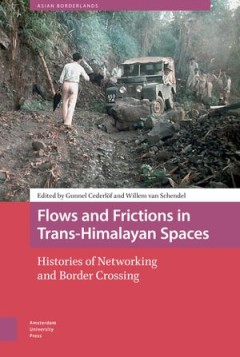Filter by

Natural Disasters, Foreign Trade and Agriculture in Mexico
This work responds to the increasing global need of measuring and analyzing impacts, vulnerabilities and coping capacity of countries, regions and communities regarding climate change, extreme weather conditions, natural disasters and institutional constraints. The case of Mexico, analyzed in this work, provides lessons for further developing countries to assess natural disasters vulnerability,…
- Edition
- 1
- ISBN/ISSN
- 978-3-319-17358-0
- Collation
- XI, 155
- Series Title
- SpringerBriefs in Environmental Science
- Call Number
- -

Encounters with Popular Pasts Cultural Heritage and Popular Culture
This volume is based on the recognition that heritage is popular and popular culture is now readily transformed into heritage whose meanings and myths reshape social life and political and economic realities as well as re-make “tradition.” The papers in this volume consider: What does popular heritage look like? To whom does it speak? Is it active in dissolving class and cultural boundaries…
- Edition
- -
- ISBN/ISSN
- 978-3-319-13183-2
- Collation
- 1 b/w illustrations, 46 illustrations in colour
- Series Title
- -
- Call Number
- -

The Transnational and the Local in the Politics of Islam The Case of West Su…
This book explores the relationship between transnational and local Islam as expressed in public discourse and policy-making, as represented in the local press. It does so against the background of local governments in majority Muslim regions across Indonesia promoting and passing regulations that mandate forms of social or economic behaviour seen to be compatible with Islam. The book situates …
- Edition
- -
- ISBN/ISSN
- 978-3-319-15413-8
- Collation
- -
- Series Title
- -
- Call Number
- -

The Tagore-Gandhi Debate on Matters of Truth and Untruth
Between 1915 and 1941, Tagore (1861-1941) and Gandhi (1869-1948) differed and argued about many things of personal, national, and international significance---satyagraha, non-cooperation, the boycott and burning of foreign cloth, the efficacy of fasting as a means of resistance and Gandhi’s mantra connecting “swaraj” and “charkha”. The author tracks the development of this dialogue an…
- Edition
- -
- ISBN/ISSN
- 978-81-322-2116-6
- Collation
- -
- Series Title
- -
- Call Number
- -

The Social Psychology of Intractable Conflicts Celebrating the Legacy of Dan…
This volume works explores a transferable theory of a specific social-psychological infrastructure, based on the work of Dr. Daniel Bar-Tal, that develops from cultures immersed in intractable conflicts. The book's approach to this issue is different from approaches that are predominant in social psychology. This is because an important inspiration of many scholars that contributed to the book …
- Edition
- -
- ISBN/ISSN
- 978-3-319-17861-5
- Collation
- -
- Series Title
- -
- Call Number
- -

Wandering the Wards: An Ethnography of Hospital Care and its Consequences for…
Wandering the Wards provides a detailed and unflinching ethnographic examination of life within the contemporary hospital. It reveals the institutional and ward cultures that inform the organisation and delivery of everyday care for one of the largest populations within them: people living with dementia who require urgent unscheduled hospital care. Drawing on five years of research embedded in …
- Edition
- -
- ISBN/ISSN
- 9781000185416
- Collation
- -
- Series Title
- -
- Call Number
- 301 FEA e

Emerging Economies Food and Energy Security, and Technology and Innovation
This volume brings together research on development in three major areas of contemporary global relevance: agriculture and food security, energy, and the institutions of national innovation. Covering six of the largest emerging and developing economies (EDEs) in the world, three Asian (China, India and Malaysia), two Latin American (Brazil and Mexico), and one African (South Africa), the book …
- Edition
- 1
- ISBN/ISSN
- 978-81-322-2101-2
- Collation
- 99 b/w illustrations
- Series Title
- -
- Call Number
- -

Micro Irrigation Systems in India
This book takes stock of micro irrigation systems (MIS), the technological intervention in India’s agricultural and water management sectors, over the past couple of decades. Based on empirical research from the major agriculturally dynamic states, viz., Gujarat, Rajasthan, Maharashtra, Tamil Nadu, Andhra Pradesh and Karnataka, the book provides a nuanced understanding and objective assessmen…
- Edition
- -
- ISBN/ISSN
- 978-981-10-0346-2
- Collation
- XIV, 178
- Series Title
- India Studies in Business and Economics
- Call Number
- -

Methodologies in Peace Psychology
This volume looks at research methods through the lens of peace studies and peace values. Apart from reviewing established methods from peace psychology, it presents some innovative ideas for conducting research in the area of peace psychology. Many of these methods are drawn from the field, from activities used by active peace practitioners. A critical component of this volume is its core ar…
- Edition
- 1
- ISBN/ISSN
- 978-3-319-18394-7
- Collation
- XXV, 454
- Series Title
- Peace Psychology Book Series
- Call Number
- -

Flows and Frictions in Trans-Himalayan Spaces Histories of Networking and Bo…
Flows and Frictions in Trans-Himalayan Spaces traces movements and connections in a region known for its formidable obstacles to mobility. Eight original essays and a conceptual introduction engage with questions of networks and interconnection between people across a bordered landscape. Mobility among the extremely varied ecologies of south-western China, Myanmar and north-eastern India, with …
- Edition
- -
- ISBN/ISSN
- 9789048555581
- Collation
- -
- Series Title
- -
- Call Number
- -
 Computer Science, Information & General Works
Computer Science, Information & General Works  Philosophy & Psychology
Philosophy & Psychology  Religion
Religion  Social Sciences
Social Sciences  Language
Language  Pure Science
Pure Science  Applied Sciences
Applied Sciences  Art & Recreation
Art & Recreation  Literature
Literature  History & Geography
History & Geography